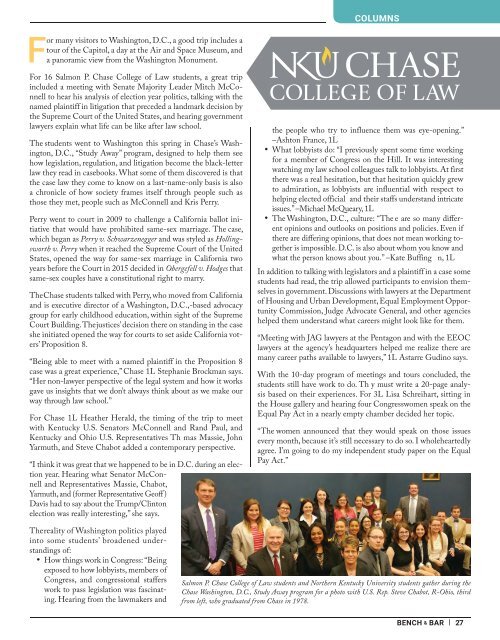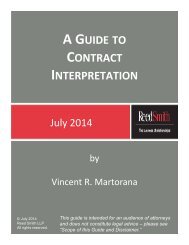you AND your spouse
BB_0716
BB_0716
You also want an ePaper? Increase the reach of your titles
YUMPU automatically turns print PDFs into web optimized ePapers that Google loves.
COLUMNS<br />
For many visitors to Washington, D.C., a good trip includes a<br />
tour of the Capitol, a day at the Air and Space Museum, and<br />
a panoramic view from the Washington Monument.<br />
For 16 Salmon P. Chase College of Law students, a great trip<br />
included a meeting with Senate Majority Leader Mitch McConnell<br />
to hear his analysis of election year politics, talking with the<br />
named plaintiff in litigation that preceded a landmark decision by<br />
the Supreme Court of the United States, and hearing government<br />
lawyers explain what life can be like after law school.<br />
The students went to Washington this spring in Chase’s Washington,<br />
D.C., “Study Away” program, designed to help them see<br />
how legislation, regulation, and litigation become the black-letter<br />
law they read in casebooks. What some of them discovered is that<br />
the case law they come to know on a last-name-only basis is also<br />
a chronicle of how society frames itself through people such as<br />
those they met, people such as McConnell and Kris Perry.<br />
Perry went to court in 2009 to challenge a California ballot initiative<br />
that would have prohibited same-sex marriage. The case,<br />
which began as Perry v. Schwarzenegger and was styled as Hollingsworth<br />
v. Perry when it reached the Supreme Court of the United<br />
States, opened the way for same-sex marriage in California two<br />
years before the Court in 2015 decided in Obergefell v. Hodges that<br />
same-sex couples have a constitutional right to marry.<br />
TheChase students talked with Perry, who moved from California<br />
and is executive director of a Washington, D.C.,‐based advocacy<br />
group for early childhood education, within sight of the Supreme<br />
Court Building. Thejustices’ decision there on standing in the case<br />
she initiated opened the way for courts to set aside California voters’<br />
Proposition 8.<br />
“Being able to meet with a named plaintiff in the Proposition 8<br />
case was a great experience,” Chase 1L Stephanie Brockman says.<br />
“Her non-lawyer perspective of the legal system and how it works<br />
gave us insights that we don’t always think about as we make our<br />
way through law school.”<br />
For Chase 1L Heather Herald, the timing of the trip to meet<br />
with Kentucky U.S. Senators McConnell and Rand Paul, and<br />
Kentucky and Ohio U.S. Representatives Th mas Massie, John<br />
Yarmuth, and Steve Chabot added a contemporary perspective.<br />
“I think it was great that we happened to be in D.C. during an election<br />
year. Hearing what Senator McConnell<br />
and Representatives Massie, Chabot,<br />
Yarmuth, and (former Representative Geoff)<br />
Davis had to say about the Trump/Clinton<br />
election was really interesting,” she says.<br />
the people who try to influence them was eye-opening.”<br />
–Ashton France, 1L<br />
• What lobbyists do: “I previously spent some time working<br />
for a member of Congress on the Hill. It was interesting<br />
watching my law school colleagues talk to lobbyists. At first<br />
there was a real hesitation, but that hesitation quickly grew<br />
to admiration, as lobbyists are influential with respect to<br />
helping elected official and their staffs understand intricate<br />
issues.” –Michael McQueary, 1L<br />
• The Washington, D.C., culture: “The e are so many different<br />
opinions and outlooks on positions and policies. Even if<br />
there are differing opinions, that does not mean working together<br />
is impossible. D.C. is also about whom <strong>you</strong> know and<br />
what the person knows about <strong>you</strong>.” –Kate Buffing n, 1L<br />
In addition to talking with legislators and a plaintiff in a case some<br />
students had read, the trip allowed participants to envision themselves<br />
in government. Discussions with lawyers at the Department<br />
of Housing and Urban Development, Equal Employment Opportunity<br />
Commission, Judge Advocate General, and other agencies<br />
helped them understand what careers might look like for them.<br />
“Meeting with JAG lawyers at the Pentagon and with the EEOC<br />
lawyers at the agency’s headquarters helped me realize there are<br />
many career paths available to lawyers,” 1L Astarre Gudino says.<br />
With the 10-day program of meetings and tours concluded, the<br />
students still have work to do. Th y must write a 20-page analysis<br />
based on their experiences. For 3L Lisa Schreihart, sitting in<br />
the House gallery and hearing four Congresswomen speak on the<br />
Equal Pay Act in a nearly empty chamber decided her topic.<br />
“The women announced that they would speak on those issues<br />
every month, because it’s still necessary to do so. I wholeheartedly<br />
agree. I’m going to do my independent study paper on the Equal<br />
Pay Act.”<br />
Thereality of Washington politics played<br />
into some students’ broadened understandings<br />
of:<br />
• How things work in Congress: “Being<br />
exposed to how lobbyists, members of<br />
Congress, and congressional staffers<br />
work to pass legislation was fascinating.<br />
Hearing from the lawmakers and<br />
Salmon P. Chase College of Law students and Northern Kentucky University students gather during the<br />
Chase Washington, D.C., Study Away program for a photo with U.S. Rep. Steve Chabot, R-Ohio, third<br />
from left, who graduated from Chase in 1978.<br />
BENCH & BAR |<br />
27



